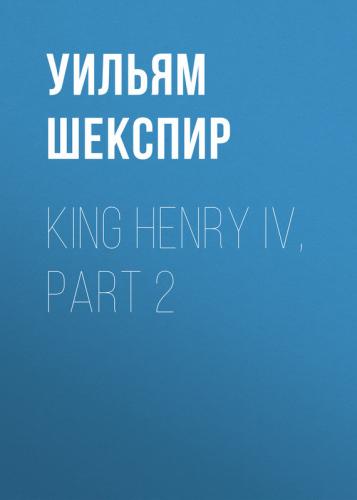That freely rend'red me these news for true.
Enter TRAVERS
NORTHUMBERLAND. Here comes my servant Travers, whom I sent
On Tuesday last to listen after news.
LORD BARDOLPH. My lord, I over-rode him on the way;
And he is furnish'd with no certainties
More than he haply may retail from me.
NORTHUMBERLAND. Now, Travers, what good tidings comes with you?
TRAVERS. My lord, Sir John Umfrevile turn'd me back
With joyful tidings; and, being better hors'd,
Out-rode me. After him came spurring hard
A gentleman, almost forspent with speed,
That stopp'd by me to breathe his bloodied horse.
He ask'd the way to Chester; and of him
I did demand what news from Shrewsbury.
He told me that rebellion had bad luck,
And that young Harry Percy's spur was cold.
With that he gave his able horse the head
And, bending forward, struck his armed heels
Against the panting sides of his poor jade
Up to the rowel-head; and starting so,
He seem'd in running to devour the way,
Staying no longer question.
NORTHUMBERLAND. Ha! Again:
Said he young Harry Percy's spur was cold?
Of Hotspur, Coldspur? that rebellion
Had met ill luck?
LORD BARDOLPH. My lord, I'll tell you what:
If my young lord your son have not the day,
Upon mine honour, for a silken point
I'll give my barony. Never talk of it.
NORTHUMBERLAND. Why should that gentleman that rode by Travers
Give then such instances of loss?
LORD BARDOLPH. Who – he?
He was some hilding fellow that had stol'n
The horse he rode on and, upon my life,
Spoke at a venture. Look, here comes more news.
Enter Morton
NORTHUMBERLAND. Yea, this man's brow, like to a title-leaf,
Foretells the nature of a tragic volume.
So looks the strand whereon the imperious flood
Hath left a witness'd usurpation.
Say, Morton, didst thou come from Shrewsbury?
MORTON. I ran from Shrewsbury, my noble lord;
Where hateful death put on his ugliest mask
To fright our party.
NORTHUMBERLAND. How doth my son and brother?
Thou tremblest; and the whiteness in thy cheek
Is apter than thy tongue to tell thy errand.
Even such a man, so faint, so spiritless,
So dull, so dread in look, so woe-begone,
Drew Priam's curtain in the dead of night
And would have told him half his Troy was burnt;
But Priam found the fire ere he his tongue,
And I my Percy's death ere thou report'st it.
This thou wouldst say: 'Your son did thus and thus;
Your brother thus; so fought the noble Douglas' —
Stopping my greedy ear with their bold deeds;
But in the end, to stop my ear indeed,
Thou hast a sigh to blow away this praise,
Ending with 'Brother, son, and all, are dead.'
MORTON. Douglas is living, and your brother, yet;
But for my lord your son —
NORTHUMBERLAND. Why, he is dead.
See what a ready tongue suspicion hath!
He that but fears the thing he would not know
Hath by instinct knowledge from others' eyes
That what he fear'd is chanced. Yet speak, Morton;
Tell thou an earl his divination lies,
And I will take it as a sweet disgrace
And make thee rich for doing me such wrong.
MORTON. You are too great to be by me gainsaid;
Your spirit is too true, your fears too certain.
NORTHUMBERLAND. Yet, for all this, say not that Percy's dead.
I see a strange confession in thine eye;
Thou shak'st thy head, and hold'st it fear or sin
To speak a truth. If he be slain, say so:
The tongue offends not that reports his death;
And he doth sin that doth belie the dead,
Not he which says the dead is not alive.
Yet the first bringer of unwelcome news
Hath but a losing office, and his tongue
Sounds ever after as a sullen bell,
Rememb'red tolling a departing friend.
LORD BARDOLPH. I cannot think, my lord, your son is dead.
MORTON. I am sorry I should force you to believe
That which I would to God I had not seen;
But these mine eyes saw him in bloody state,
Rend'ring faint quittance, wearied and out-breath'd,
To Harry Monmouth, whose swift wrath beat down
The never-daunted Percy to the earth,
From whence with life he never more sprung up.
In few, his death – whose spirit lent a fire
Even to the dullest peasant in his camp —
Being bruited once, took fire and heat away
From the best-temper'd courage in his troops;
For from his metal was his party steeled;
Which once in him abated, all the rest
Turn'd on themselves, like dull and heavy lead.
And as the thing that's heavy in itself
Upon enforcement flies with greatest speed,
So did our men, heavy in Hotspur's loss,
Lend
